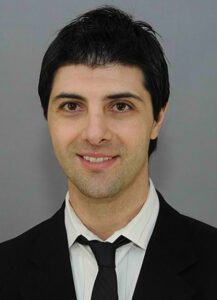- Retina Research Foundation
- About RRF
- Pilot Study Grants
- Grant Recipients 2025
- Samuel M. Wu, PhD
- Yingbin Fu, PhD
- Graeme Mardon, PhD
- Wei Li, PhD
- Yuqing Huo, MD, PhD
- Rui Chen, PhD
- Wenbo Zhang, PhD
- Curtis Brandt, PhD
- Lih Kuo, PhD
- Timothy Corson, PhD
- Jianhai Du, PhD
- Francesco Giorgianni, PhD
- James Monaghan, PhD
- Seongjin Seo, PhD
- Andrius Kazlauskas, PhD
- Erika D. Eggers, PhD
- Ann C. Morris, PhD
- Ming Zhang, MD, PhD
- Christine Sorenson, PhD
- Alex J. Smith, PhD
- Jeffrey M. Gross, PhD
- David M. Wu, MD, PhD
- Kinga Bujakowska, PhD
- Eric Weh, PhD
- Ching-Kang Jason Chen, PhD
- Jakub K. Famulski, PhD
- Thanh Hoang, PhD
- Georgia Zarkada, MD, PhD
- Eleftherios Paschalis Ilios, PhD
- Oleg Alekseev, MD, PhD
- Erika Tatiana Camacho, PhD
- Patricia R. Taylor, PhD
- Elizabeth Vargis, PhD
- Publications
- Grant Guidelines and Information
- Grant Application
- Grant Recipients 2025
- Research Programs
- Contact Us
- Giving
- RRF History
- Home
Eleftherios Paschalis Ilios, PhD
Department of Ophthalmology
Massachusetts Eye and Ear Infirmary
Harvard Medical School
Boston, MA
TRANSLATIONAL/PRE-CLINICAL RESEARCH PROJECT
Research Interests
Age-related macular degeneration (AMD) is the leading cause of central vision loss in people over 50. Globally, it is estimated that approximately 196 million people are affected by AMD, with the majority being in developed countries where the population is aging. In the United States, approximately 11 million people have some form of AMD, with about 1.8 million of them having the advanced form. The standard of care for the treatment of wet AMD is frequent intravitreal injections of antibodies against the vascular endothelial growth factor (VEGF). Although these injections retard the development of new retinal vessels, they also gradually cause progressive neuroretinal atrophy and blindness, likely due to the need of life long administration. More recently, bi-specific antibodies that can target two pathways involved in the progression of the disease, such as VEGF and Ang2, were approved by FDA as a more effective therapy for AMD, though clinical data suggest that the new therapy provides marginal improvement in patients.
Plans for 2025
In the 2025 grant period, Dr. Paschalis will generate a GMP quality bispecific antibody, with high concentration (40mg/ml) and low endotoxin (<0.01 EU/ml) for intravitreal use in non-human primates and humans and perform additional AMD studies to generate results with statistical power.
Specific Aims:
1) Develop a GMP-quality high concentration bi-specific antibody for intravitreal injection in non-human primates and humans.
2) Assess the safety and efficacy of the concentrated, GMP-quality antibody in non-human primates at a statistically powered level results. This will allow the initiation of a phase I clinical trial, if results are encouraging.
Progress in 2024
Dr. Paschalis Ilios’ objective is to develop a new therapy for AMD. Along with his colleagues, he has discovered two pathways that cause neovascularization and if blocked simultaneously, can result in complete inhibition of development of new vessels (neovascularization). He is in the final stages of assessing the safety and efficacy of a new bi-specific antibody and if results in 2024 are positive, Dr. Paschalis Ilios intends to rapidly transition into human clinical trials.

